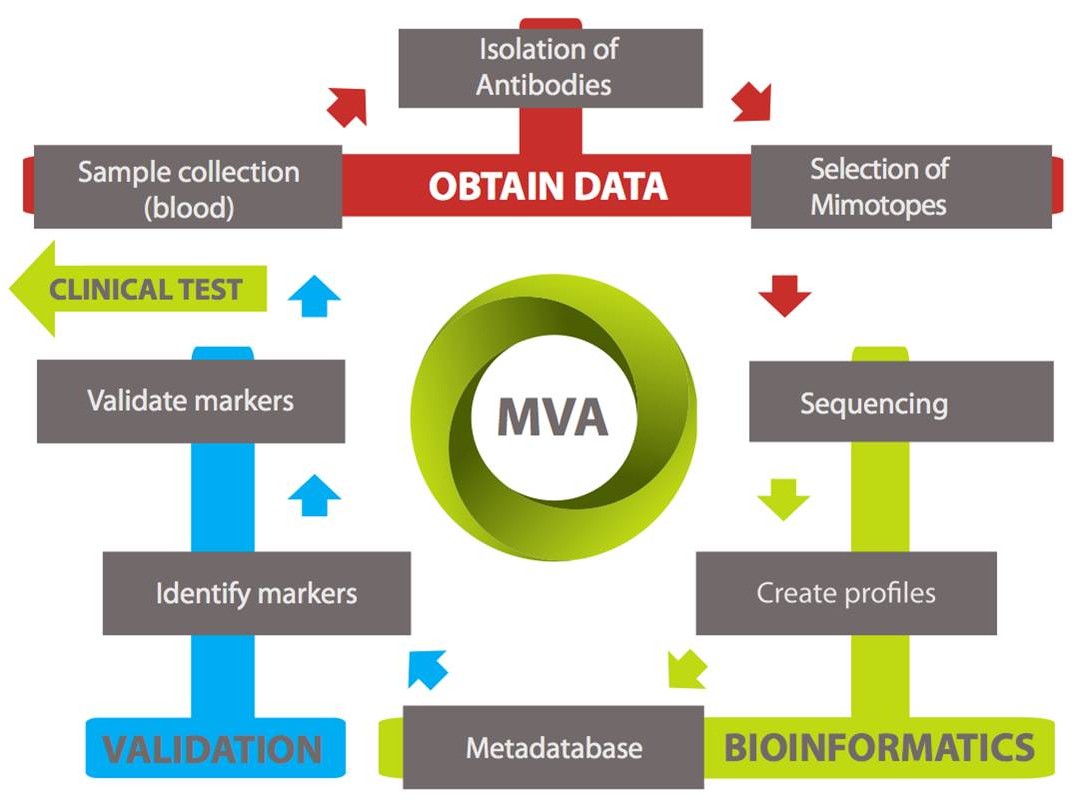Risk Assessment of Effects at Nanoscale Level – Taking a Closer Look at the Mimotope Variation Analysis
In this context, one important analysis that is part of PANBioRA’s approach is the Mimotope Variation Analysis that allows the assessment of patient-specific interactions between biomaterials and the immune system. Beginning of June the 17 PANBioRA partners have met in Brussels for their first official periodic review meeting in month 18 of the project. In the presence of a representative of the European Commission each partner has presented the performed work since the beginning of the project as well as main results achieved. The PANBioRA system is composed of four different types of analyses allowing biomaterial risk assessment at nano-, micro- and milliscale level. During the first 1½ years of the project, different project partners have worked on these analyses with significant progress. Among these different testing systems, there is the Mimotope Variation Analysis (MVA) developed and patented by the Estonian biotechnology company Protobios which has never been used in the framework of biomaterial assessment before. Immune responses contribute to the development of many common disorders (e.g. Alzheimer’s disease) but also to immunologic diseases including infectious diseases (e.g. tuberculosis, hepatitis, pneumonia). With the MVA technology, Protobios has developed a method to create a personalised outline, called immunoprofile, allowing to define an individual’s humoral immune response profile. Over the past years Protobios has developed a metadatabase of immunoprofiles of more than 2000 individuals. This enables them to predict an individual’s susceptibility to specific diseases. For PANBioRA, the MVA technology is being further developed and adapted to identify a patient-specific response of the immune system to biomaterials. A biomaterial specific immunoprofile database is being generated allowing to comprehensively understand the properties, interaction and fate of engineered biomaterials in relation to human health and environment. This will pave the way for the design of new generations of biomaterials with tailored functional and immunological properties. As PANBioRA is aiming to provide a faster, reliable and quantitative assessment of new biomaterials, the MVA technology plays a substantial part in the overall PANBioRA system. One of the major challenges for the upcoming project months will be to successfully integrate the different test modules, developed within the project in one comprehensive system. Until the beginning of next year, a first prototype of the whole system will be ready in order to further test, improve and validate. PANBioRA will provide substantial health benefits for millions of patients who are candidates for receiving medical implants by improving their function and reducing the chance of failure due to inflammation. For more details on PANBioRA please visit: www.panbiora.eu PANBioRA is coordinated by Steinbeis 2i GmbH in cooperation with 16 partners: Protip Medical (Scientific Coordinator), Dolmen Design and Innovation Limited, Biodevice Systems, Protobios, Elvesys SAS, Steinbeis Advanced Risk Technologies Institute doo Kragujevac, Steinbeis Advanced Risk Technologies GmbH, Commissariat A L’Energie Atomique Et Aux Energies Alternatives, Pro-active, Aalto-Korkeakoulusäätiö, Turgut Ozal Education SHA, The University of Nottingham, Agencia Estatal Consejo Superior de Investigaciones Científicas, Dublin City University, Institut National de la Santé et de la Recherche Medicale, Centre Hospitalier Universitaire de Liège This project has received funding from the European Union’s Horizon 2020 research and innovation programme under Grant Agreement No 760921.



